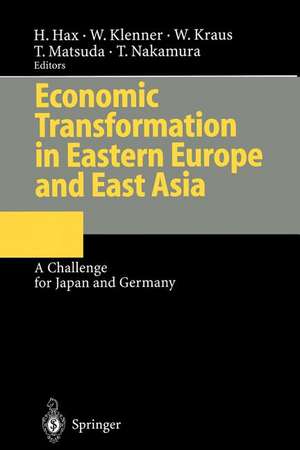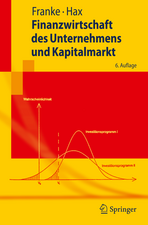Economic Transformation in Eastern Europe and East Asia: A Challenge for Japan and Germany
Editat de Herbert Hax, Wolfgang Klenner, Willi Kraus, Tomoo Matsuda, Takafusa Nakamuraen Limba Engleză Paperback – 14 dec 2011
Preț: 622.86 lei
Preț vechi: 732.77 lei
-15% Nou
Puncte Express: 934
Preț estimativ în valută:
119.24€ • 122.63$ • 98.92£
119.24€ • 122.63$ • 98.92£
Carte tipărită la comandă
Livrare economică 17 februarie-03 martie
Preluare comenzi: 021 569.72.76
Specificații
ISBN-13: 9783642852312
ISBN-10: 3642852319
Pagini: 156
Ilustrații: VII, 142 p.
Dimensiuni: 155 x 235 x 8 mm
Greutate: 0.23 kg
Ediția:Softcover reprint of the original 1st ed. 1996
Editura: Springer Berlin, Heidelberg
Colecția Springer
Locul publicării:Berlin, Heidelberg, Germany
ISBN-10: 3642852319
Pagini: 156
Ilustrații: VII, 142 p.
Dimensiuni: 155 x 235 x 8 mm
Greutate: 0.23 kg
Ediția:Softcover reprint of the original 1st ed. 1996
Editura: Springer Berlin, Heidelberg
Colecția Springer
Locul publicării:Berlin, Heidelberg, Germany
Public țintă
ResearchDescriere
The economic transfonnation taking place in Eastern Europe and Asia is in particular a challenge for Japan and Gennany, because these two states as the immediate neighbors of the developing regions are directly affected and also because they are the strongest economic powers in their regions and have the necessary potential to influence developments there. Japan and Gennany are affected in many ways, both positively and negatively. Should the economic and social transformation run into difficulties, leading to economic and political chaos, perhaps even to armed conflicts, then economy and social fabric of the prosperous neighbors would doubtlessly suffer. In the past, Japan and the South-East Asian region have already experienced how economic problems in China caused millions of Chinese to seek their fortunes in other countries. An economic and political destabilization of China would today probably have even greater effects on migration flows. Similar effects can be expected in Europe, if the transfonnation process in Eastern Europe should fail. But even less dramatic developments in Eastern Europe and East Asia can have deleterious consequences for Gennany and Japan. Both nations are linked closely to the transfonning economies near them, though at a fairly low level. A reduction in trade with them, a refusal to service debts and other economic frictions ensuing out of economic and political troubles would of necessity hamper the prosperity of Japan and Gennany. A successful transfonnation process would without doubt benefit all economic partners to a considerable extent.
Cuprins
1. A Critical View of Japan as an Economic Power.- 2. Germany’s Economic Strength and Integration Willingness.- 3. Key Factors for Japan’s High Rate of Economic Growth.- 4. The Shift from a Net Capital Exporter to a Net Capital Importer — The Case of Germany —.- 5. The Japanese Labor Market Today.- 6. Germany’s Contribution to the Development of Labor Markets in Eastern Europe.- 7. Remarks Concerning the Transfer of Managerial and Organizational Methods to Eastern Europe: Opportunities and Problems for Japan.- 8. Transferring Managerial and Organizational Methods to Eastern Europe.- 9. German Unification and the Effects on Central and Eastern Europe.- 10. The Economic Effects of German Reunification on West and East Europe.- 11. Effects of Growing Economic Integration in East Asia on Japan’s Economy.









